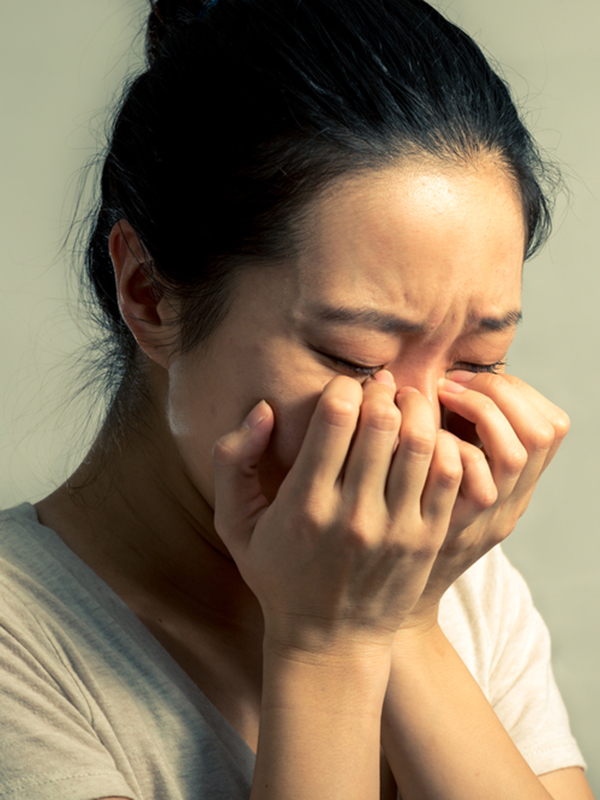I've always been bad with death. And wow — what a statement. Talk about a groundbreaking revelation nobody's made before. Can you believe how real I'm getting? This is big.
So yes, as you can tell, I also hate "feelings." Well, that's a lie: I can do happiness, anger, joy, irritability, and everything under the emotional spectrum other than sadness. I hate sadness. I hate crying, and I hate mourning, and, like most of my family, I prefer to just plough through whatever it is that's going on until the time comes to finally cry/acknowledge the real problem (which I hate) on my own time, and in front of nobody aside from maybe one or two people. Because aside from my willingness to write about my personal life on the Internet (hello!), I like to keep my feelings to myself.
Which I understand can be a problem because emotional vulnerability is necessary in terms of being a complete person — which I will let myself be, but around very specific people. And aside from choosing to deal with disappointment by compartmentalizing my emotions until I can acknowledge them in a "safe" space, that technique usually works. Although for a while, death shot that system to shit.
The first "death" I remember is my Dad's ex-sister-in-law's husband (did you get that?), who died in a car crash when I was four. I stayed in the car with my Grandma during the visitation because, again, I was four, and then aside from great aunts or kids from high school (which I openly wept about because I was 15 and the idea that we could die even as teens was very new and jarring), I was scot-free until I was 17. That's when my Nana died, and oh boy. The pattern was set.
I got wasted at her and my Grandpa's house the weekend before because our family knew this would be our last Thanksgiving all together. She died six days after (on real Thanksgiving), and when we showed up to my Grandpa's place to help go through her things, I rotated between chain-smoking and crying in front of the TV drinking whatever alcohol was available. I hated it. She'd been sick for a year, and it wasn't a surprise, but denial had kept me relatively safe until I was forced to confront reality. Now I had to deal not only with her having died, but with saying goodbye. Publicly. At her funeral, where I cried and hugged everybody who came near me, and where I had absolutely no control over my emotions. An actual nightmare.
This basically happened at every funeral I attended afterwards, until I began to dread death on a whole new level because it meant people would see me as totally out of control of my feelings. But then, magically in my early 20s, I learned the art of compartmentalization: after my friends and I saw a motorcyclist get severed in half on the road in front of the restaurant we were eating at, I was able to keep it together not only during the event, but afterwards. Somehow, still numb from what we witnessed, the three of us still went to the movies, and I didn't shed a tear until work the next day, when I had a meltdown in the bathroom at work (which was also related to about 25924824 things in life). I figured I could either mourn a tragedy that didn't belong to me, or I could move on. "Life is for the living," my Aunt told me after my Nana died. I've used that as a mantra ever since.
And so set the trend. With every death or near-death, I did what my parents and family did and do best: I put the feelings somewhere else (anywhere else, but usually into work and jokes) until I could let my guard down. And because of that, I could still go to school, go to work, make my deadlines, and keep my plans. And I know this isn't for everybody — I know some people reading this may think death needs to be mourned publicly, and that emotions are for everyone, and that we should all feel free to cry and bawl in public. And that's fine. You do you. I can't do that, and I don't want to. In fact, recognizing that I'd prefer to mourn and cope privately has helped me get through death and even sickness and tragedy easier and more quickly. When my Grandmother died in April, I dealt with it the way I knew how: I focused on work, on plans, on friends, and when I felt I needed to, I let my guard down to let the reality sink in. But at the funeral, I didn't cry — nobody did. She was 92 and she'd been sick for years, and we chose to celebrate her life (with shrimp and ham and darts at my Uncle's house). Some people may be horrified to know that we all channeled whatever feelings we had into making jokes at the church (which she would've been more than fine with), and that the only times I cried were on my own, and not for long. But that's okay. So I'm writing this for anyone who might not be super emotional — or are, but, like me, would rather go into survival/get-shit-done mode and deal a little bit later, then giving it all away up front.
Tips for death-coping, from me to you:
1) Don't feel guilty for not "grieving" in some conventional way
Funerals suck. Death sucks. Hospitals suck. Hospices somehow suck even more. All of it is just the worst, but the first thing I did when my Nana died was make a bunch of jokes because that's the easiest way for me to process things. I don't like dramatic gestures, and I don't like being told in a roundabout way what's going on. Give me the facts. Talk to me like we're talking business, because I'm not going to go out of business mode until the smoke's cleared and the funeral's over, and I'd rather deal with what I've got to do then retreat to an emotional den. And I don't want to feel wrong for grieving that way, and neither should you.
2) Don't feel like you have to hug anybody
I'll hug the shit out of my friends and the people I love, but when I'm in an obvious emotional situation, let me lone wolf this out. At funerals, I get it: people want to hug. That's cool, we can do that. But if I tell you something's happened, and you're going in for the kill, read the body language. If I'm talking in a loud voice and about said death as though I'm removed from the situation, I'm probably not feeling super affectionate. And if you react the same way, it's completely fine to give the signs of "please don't touch me" and "oh, it's okay" if somebody asks if you want a hug. (Best friends can/will pick up on this — anyone who challenges you on it, beware.)
3) Laugh about things
For some reason, we've been told that we need to mourn via absolute doom/gloom. That isn't the case. I went to a funeral in the winter under a super bleak circumstance, and even the people who'd been crying were joking around and laughing about whatever. This isn't Downton Abbey, and you don't need to wear black for a year. Some people are into mourning in the dramatic sense of the word, but if you're not, find the relative/pal who does things similarly and stick with them.
4) Take time out for you, though
There is a very fine line between compartmentalizing until you're ready to process, and choosing not to process something at all. I have done both, and the latter ends with you crying on the 401 because a certain pit stop ran out of Timbits. (It is also my worst nightmare.) (Both the crying on the 401 and the running out of Timbits.) Processing doesn't mean you need to cry or freak out or write poetry or anything — it can mean going to the movies and taking time out of your everyday distractions. Or going through old photos, or talking to a best pal or boyfriend/girlfriend. There's no "right" or "wrong" way to mourn or process grief, but at some point, you do need to process it. Just be careful not to drown your sorrows too much because that can lead to a whole other set of problems. (All of which will make you very emotional, let's just say that.) Or let anyone infringe on your "I need time alone" time because damn it, this is your house. These are your rules*.
*I'd love to hear this song at a funeral.











